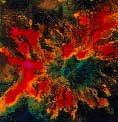Need for Aesthetics seen through recent studies in the Brain &
Consciousness.
Humanity possesses an unknown striving for happiness and
fulfilment. In determining the need for aesthetics I start with the needs of our twin abilities, human
consciousness on the one hand, and on the other, how the brain affects our view on life. The two seem to be quite
different but are very inter-related. One cannot rely solely on the operations of the brain for our fulfilment. It
often tells us (or one part does) to acquire goods and lifestyle to achieve happiness, for us only to find such
things unsatisfying. We strive then for the missing ingredient. But where? Striving is a manifestation of that added
ingredient - evolution, of striving for perfection and new understandings. We just cannot stay still. Yet while our
brain functions appear to cause us to operate in one way or another, it seems to be governed by an external and
overriding universal set of philosophical principles, the need for truth, beauty, compassion, social co-operation,
harmony, awareness, of evolving into something better. This external set of values, for me, is where consciousness
or the soul offers an explanation. For its own total fulfilment and survival human consciousness seems to need a mix
of the physical, intellectual, emotional, and spiritual, i.e. the total integration of the brain's functions. Where
imbalance occurs problems arise. Further there seems an hierarchy in these needs. It would seem that consciousness
demands primarily an holistic interconnected view of life, everything in balance leading to the greater good of
awareness of all things.
Consequently I find I have problems with the so-called
progress of humanity as seen through the march of scientific investigation on the one hand, and the inherent
abilities of humanity on the other. Let me explain. If we consider that here in the 21st century we enjoy
the most advanced state in terms of ability and understanding of what it is to be human and our place in the
unfolding evolution of the universe, then do we regard all previous generations as somehow lacking or restricted
because they do not possess current knowledge? If we do then we are in trouble! There is an imbalance favouring the
intellectual. Not only does it presuppose some form of hierarchy in the hereafter, it denies the inherent abilities
of our forebears to understand and express humanity in all its glory. Was Bach, Michelangelo, the medieval builders
of cathedrals, even the psalm writers or Hebrew prophets, let alone the druids and builders of Stone Henge or the
craftsmen of the Sutton Hoo artefacts, were all these somehow diminished because of their lack of knowledge? I think
not. Why? Aesthetics provide the answer. It is not dependent on knowledge but on expressing the infinite within us,
our search for beauty, understanding of what humanity is in relation to the inherent concept of the infinite within
us. It is not dependent on language or scientific knowledge. It represents the unexpressed journey of humanity
towards its own emotional and spiritual fulfilment through a true integration of consciousness and brain.
So how do we reconcile this problem of the acknowledged fulfilment of past generations?
Few would disagree that humanity faces increasingly large problems of a personal, national and international nature.
For me aesthetics is how we decide to live our lives, what focus we give to our own sense of self fulfilment and
development. This should be achieved through an evolving sense of morality, goodness and beauty played out in the
wonder of creation and our interaction with it. It should be a journey, a never ending one with which we must engage
both as individuals and socially aware human beings through engagement with the arts. Equally it should be full of
knowledge, scientific discovery and understanding, but these should be seen as explanations or reinforcements of the
feelings which aesthetics engender deep within us, the 'how' rather than the 'why' of existence. Those, for example,
who built the great cathedrals had little scientific understanding of the universe or the operation of the brain and
neither did J S Bach, yet few would deny their enduring legacy in architecture and music which even fewer, if any,
can equal today.
Aesthetics, in reality, is how we decide to manipulate our brains,
our left and right hemispheres given that our ability to use them is constantly expanding and changing
and that there is an historic state of tension between the two. According to recent research our ability to
comprehend physics and music, for example, may reside in both hemispheres. The distinction lies in how they view the
data. The most fundamental difference is that all experience originates in the right hemisphere which sees the
picture in its holistic entirety. It comprehends meaning, social relationships, emotions, morality, appreciates
music, art, architecture, poetry, the progress of time, and is the seat of the spiritual side of life. The problem
is that it presents us with impressions, lacking in detail and clarity. For these it hands over to the left
hemisphere, which focuses on extracting and organising the detail of what is presented. It is the seat of precise
language, mathematics, logic, analysis, precision. The problem is twofold. All perceptions originate in the right
hemisphere. Nothing originates in the left. In an ideal situation the left would then transfer its precise findings
back to the right so that we would experience the whole picture, holistic but with detail. The second problem is
that the left appears to be competitive, often trying to persuade us to base judgements on its own findings without
reference back to the right for the whole picture through its own desire to organise everything based upon its own
findings. Consequently it attempts to 'persuade' us that its perceptions, based on language, analytical detail and
logic, are the only reality needed for our existence.
Few could deny that the left
hemisphere has brought great benefits to humanity in terms of the industrial and technological
revolutions which we have experienced in the last few centuries. Equally it has never been more subject to adverts
for consumerism which aim to provide solutions. Today our left hemispheres dominate. It uses its view of
consciousness in a very restricted way. For example, the need for evolution. Yes, but seen in terms, not holistic,
but only for that individual, the need for greater wealth or power, i.e. increased selfishness at the expense of
society. It distorts what our consciousness has to offer. One consequence is that we live our lifestyles out of the
rhythm of a natural physical environment, in cities, man made and of ever increasing consumerism. We live according
to the dictat of individual rights rather than social responsibilities. Thus we become more selfish, inward looking
for solutions, not willing to see the whole picture, and that selfishness translates into a desire for power and
material goods, often at whatever the cost to society or the environment. The over dominance of language, logic and
self-perceived 'truth' based on this concept of selfishness makes our lives dependent on consumerism, our politics
on expediency and the need to retain power by whatever means, our education on points, our laws on precedence and
observance of forms and minutiae rather than on the broader picture.
In
Christianity left hemisphere dominance has led to the supremacy of conformity, rules (creeds), hierarchy,
fundamentalism. Thus Christianity has become beset with obedience to bishops, creeds, entry only by baptism, and
global solution to salvation based on a left hemisphere acceptance of the precepts of the 'Organisation'.
Compare this to Jesus' holistic summary of the law, love God and your fellow human
being. These ideas originated in the right hemisphere, passed to the left hemisphere for execution, i.e.
in his parables, teaching and healing, but always eventually emanating from his right hemisphere with its total
world view, a view which, for example, enabled him to heal the servant of a dreaded Roman Centurion, to say "render
unto Caesar the things which are Caesar's and unto God the things which are God's", or utter the holistic
sayings included in the 'Sermon on the Mount'.
What then can be achieved if we
redress the balance through the right hemisphere approach of aesthetics which involve personal freedom
and development, seeing the broader picture, understanding and relationships? This alone can lead to inner
satisfaction, upliftment and inter-relationships, empathy, acceptance of others. Further, such an approach is
non-judgemental and accepts the validity of all those who exhibit a similar open approach.
For me there is a need to move onto a wider plain, possibly beyond that of any religion in
seeking the solution to the ultimate happiness and fulfilment of humanity. For me this imbalance can be
cured only by a greater appreciation and use of aesthetics. The problem is aesthetics is based on the individual and
his/her psychological needs, aspirations, and cultural identity. It is more ephemeral and delicate, resistant to
rules and conformity. It is based on finding and understanding the broad picture. It is a personal journey which
must be stimulated, not controlled. Consequently it is difficult to fit it into current standards of logic and
science which are more tangible, demonstrable and so understandable. That is why it is decline. That is why it needs
first to be more understood, then more practised.



